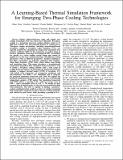A Learning-Based Thermal Simulation Framework for Emerging Two-Phase Cooling Technologies
Author(s)
Yuan, Zihao; Vaartstra, Geoffrey; Shukla, Prachi; Lu, Zhengmao; Wang, Evelyn; Reda, Sherief; Coskun, Ayse K.; ... Show more Show less
DownloadAccepted version (742.2Kb)
Open Access Policy
Open Access Policy
Creative Commons Attribution-Noncommercial-Share Alike
Terms of use
Metadata
Show full item recordAbstract
© 2020 EDAA. Future high-performance chips will require new cooling technologies that can extract heat efficiently. Two-phase cooling is a promising processor cooling solution owing to its high heat transfer rate and potential benefits in cooling power. Two-phase cooling mechanisms, including microchannel-based two-phase cooling or two-phase vapor chambers (VCs), are typically modeled by computing the temperature-dependent heat transfer coefficient (HTC) of the evaporator or coolant using an iterative simulation framework. Precomputed HTC correlations are specific to a given cooling system design and cannot be applied to even the same cooling technology with different cooling parameters (such as different geometries). Another challenge is that HTC correlations are typically calculated with computational fluid dynamics (CFD) tools, which induce long design and simulation times. This paper introduces a learning-based temperature-dependent HTC simulation framework that is used to model a two-phase cooling solution with a wide range of cooling design parameters. In particular, the proposed framework includes a compact thermal model (CTM) of two-phase VCs with hybrid wick evaporators (of nanoporous membrane and microchannels). We build a new simulation tool to integrate the proposed simulation framework and CTM. We validate the proposed simulation framework as well as the new CTM through comparisons against a CFD model. Our simulation framework and CTM achieve a speedup of 21 × with an average error of 0.98° C (and a maximum error of 2.59° C). We design an optimization flow for hybrid wicks to select the most beneficial hybrid wick geometries. Our flow is capable of finding a geometry- coolant combination that results in a lower (or similar) maximum chip temperature compared to that of the best coolant-geometry pair selected by grid search, while providing a speedup of 9.4 x.
Date issued
2020-03Department
Massachusetts Institute of Technology. Department of Mechanical EngineeringJournal
Proceedings of the 2020 Design, Automation and Test in Europe Conference and Exhibition, DATE 2020
Publisher
IEEE
Citation
Yuan, Zihao, Vaartstra, Geoffrey, Shukla, Prachi, Lu, Zhengmao, Wang, Evelyn et al. 2020. "A Learning-Based Thermal Simulation Framework for Emerging Two-Phase Cooling Technologies." Proceedings of the 2020 Design, Automation and Test in Europe Conference and Exhibition, DATE 2020.
Version: Author's final manuscript